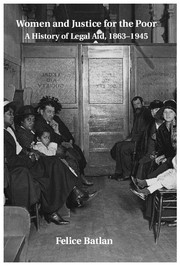Book contents
- Frontmatter
- Contents
- List of Plates
- Acknowledgments
- Abbreviations of Primary Organizations
- Introduction
- PART I A FEMALE DOMINION OF LEGAL AID, 1863–1910
- PART II THE PROFESSIONALIZATION OF LEGAL AID, 1890–1921
- 3 Of Immigrants, Sailors, and Servants: The Legal Aid Society of New York
- 4 Reinventing Legal Aid
- PART III DIALOGUES: LAWYERS AND SOCIAL WORKERS, 1921–1945
- Conclusion
- Index
- Plate Section
3 - Of Immigrants, Sailors, and Servants: The Legal Aid Society of New York
from PART II - THE PROFESSIONALIZATION OF LEGAL AID, 1890–1921
Published online by Cambridge University Press: 05 May 2015
- Frontmatter
- Contents
- List of Plates
- Acknowledgments
- Abbreviations of Primary Organizations
- Introduction
- PART I A FEMALE DOMINION OF LEGAL AID, 1863–1910
- PART II THE PROFESSIONALIZATION OF LEGAL AID, 1890–1921
- 3 Of Immigrants, Sailors, and Servants: The Legal Aid Society of New York
- 4 Reinventing Legal Aid
- PART III DIALOGUES: LAWYERS AND SOCIAL WORKERS, 1921–1945
- Conclusion
- Index
- Plate Section
Summary
The Legal Aid Society of New York (NYLAS) represented a significant departure from women's legal aid organizations and their focus on women's unique responsibilities and needs, as well as from the Bureau of Justice's emphasis on brotherhood. The New York society provided legal services to both men and women, it handled a wide range of legal cases, and male attorneys generally controlled it. It was also a secular organization in its approach, far removed from the Social Gospel and the sentimentality of earlier organizations. The Legal Aid Society of New York saw itself as part of the legal profession and viewed the mission of legal aid as Americanizing and disciplining new immigrants into the wage economy. Importantly, its leaders generally imagined the immigrants in need of legal services to be primarily male. This model for legal aid services spread from New York throughout urban areas in New England and to parts of the Midwest. Under its sway, legal aid organizations no longer saw themselves as charities, although they adopted some of the most punitive aspects of turn-of-the-century philanthropies.
In comparison to women's legal aid organizations, which were founded and managed primarily by native-born Protestant women, the precursor to the New York Legal Aid Society – Der Deutscher Rechts-Schutz Verein – was established by wealthy male German immigrants in 1876 to provide various forms of aid, including legal assistance, to German immigrants. Several of the founders of this organization were refugees from the 1848 revolution in Germany, in which ideas of constitutionalism and legal reform played large roles. After establishing themselves in the United States, the founders generally became staunch Republicans, and a good number of them entered the legal profession. They were committed to free labor, constitutionalism, and high German culture. In contrast, the founders of New York's Working Women's Protective Union, discussed in Chapter 1, tended to be Democrats and were often Irish American, and some had connections to the labor movement. There was little overlap between those who supported the Working Women's Protective Union and those who supported the New York society in its early years.
- Type
- Chapter
- Information
- Women and Justice for the PoorA History of Legal Aid, 1863–1945, pp. 87 - 122Publisher: Cambridge University PressPrint publication year: 2015



